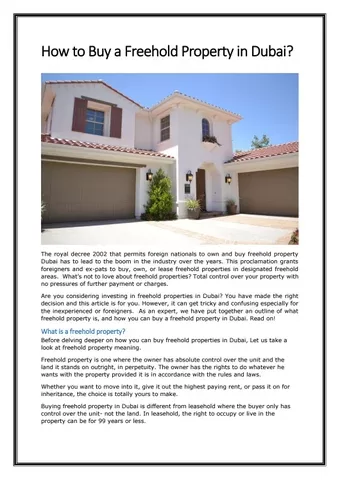Freehold vs Leasehold dubai
Dubai’s real estate market is dynamic and diverse, offering numerous property investment opportunities for both residents and foreign investors. One of the key decisions prospective buyers face when entering this market is choosing between freehold и leasehold properties. Each has its own advantages, making it essential to understand the differences between these two types of ownership before committing to a purchase.
This comprehensive guide will provide you with everything you need to know about freehold vs leasehold properties in Dubai, including the freehold areas in Dubai, leasehold areas in Dubai, and other relevant factors to consider when making your investment.

Freehold Properties in Dubai
What is Freehold Property?
A freehold property in Dubai refers to full ownership of both the land and the property built on it. This ownership is not restricted by time, meaning the buyer owns the property outright and can sell, lease, or pass it on to heirs without limitations. Freehold properties are particularly appealing to foreign nationals, as Dubai’s government has designated specific zones where expatriates are allowed to buy properties on a freehold basis.
Freehold Areas in Dubai
Foreign investors can purchase freehold property in certain freehold areas in Dubai, which include some of the most luxurious and desirable locations in the city. Notable freehold zones in Dubai include:
- Dubai Marina
- Центр Дубая
- Palm Jumeirah
- Business Bay
- Jumeirah Beach Residence (JBR)
Other popular areas for freehold villas in Dubai are Arabian Ranches, Emirates Hills, and Jumeirah Park. Additionally, freehold apartments for sale in Dubai can be found in developments such as Emaar Beachfront, Jumeirah Heights, and Dubai Silicon Oasis freehold.

Benefits of Freehold Properties
- Complete Ownership
Owners of freehold properties in Dubai have full rights over both the property and the land. They can sell, lease, or pass on the property to their heirs without restrictions, offering long-term stability. - Investment Potential
Freehold Dubai properties tend to appreciate in value over time, making them attractive for investors looking for long-term capital growth. Areas such as Dubai Marina и Palm Jumeirah are renowned for their investment returns. - Inheritance Rights
One of the major benefits of buying a freehold property in Dubai is that it can be passed down to family members, ensuring long-term security for future generations. - Flexibility and Control
Owners of freehold villas in Mirdif or freehold apartments have the flexibility to make alterations or renovations to their property without needing permission from a third-party landowner.
Things to Consider with Freehold Properties
- Higher Costs: The cheapest freehold property in Dubai may still be more expensive than a leasehold property due to the ownership of the land.
- Specific Zones: Foreign investors are limited to purchasing in designated freehold zones in Dubai, although these areas are among the most prestigious in the city.
Leasehold Properties in Dubai
What is Leasehold Property?
Leasehold properties in Dubai involve purchasing the right to use and occupy a property for a set period, usually up to 99 years. In this case, the buyer does not own the land the property is built on, which remains with the landowner, often a local Emirati or the government.
Leasehold Areas in Dubai
Leasehold areas in Dubai are typically located in older, more established neighborhoods. These areas include:
- Deira
- Umm Suqeim
- Jumeirah
- Al Barsha
Buyers in these areas sign a lease agreement, giving them rights to the property for the agreed period, after which ownership reverts to the landowner unless the lease is renewed.
Benefits of Leasehold Properties
- Lower Purchase Costs
Leasehold properties are generally more affordable than freehold properties, making them an attractive option for buyers looking for a budget-friendly entry into Dubai real estate market. - Prime Locations
Many leasehold areas in Dubai are located in prime spots, such as Jumeirah or Al Barsha, which may not be available as freehold zones. - Long-Term Occupancy
A 99-year lease property allows buyers to enjoy long-term usage of the property. While they do not own the land, they can live in or rent out the property for almost a century.
Things to Consider with Leasehold Properties
- Lack of Land Ownership: Unlike freehold properties, leasehold buyers do not own the land.
- Limited Control: Major alterations to the property may require permission from the landowner.
- Lease Expiration: After the lease period ends, the property usually reverts to the landowner unless the lease is renewed.
Freehold vs Leasehold Dubai: Key Differences
When comparing freehold vs leasehold properties in Dubai, several key distinctions stand out:
- Ownership:
Freehold ownership gives you full rights over both the property and the land, while leasehold only grants you rights to the property for a fixed term. - Control:
Freehold owners have complete control over their properties. In contrast, leasehold owners may need permission for modifications or improvements. - Cost:
Freehold properties are often more expensive upfront, but they provide long-term value and potential appreciation. Leasehold properties tend to be more affordable, but the landowner retains ultimate ownership. - Duration:
Freehold ownership is permanent, while leasehold properties come with a lease term (usually 99 years), after which the property reverts to the landowner unless renewed. - Расположение:
Freehold areas in Dubai are concentrated in newer developments, while leasehold areas are often located in older, more established neighborhoods.
Dubai Free Zone Areas and Real Estate
In addition to freehold и leasehold properties, Dubai also features freezone areas designed to attract foreign businesses. These free zone areas in Dubai offer 100% foreign ownership, tax exemptions, and other incentives for companies. Popular freezones include:
- Jebel Ali Free Zone Location: One of the largest and oldest freezones, known for its logistical advantages.
- Dubai Investment Park Free Zone
- Dubai Silicon Oasis Free Zone
- Dubai Industrial Free Zone
It’s important to note that freezone areas are primarily for business operations, and freezone companies cannot directly buy residential properties in Dubai unless they are located within a freehold area.

Заключение
Choosing between freehold vs leasehold Dubai depends on your financial goals, investment strategy, and lifestyle preferences. For long-term investors and those seeking permanent residency, freehold properties offer full ownership and greater control. On the other hand, leasehold properties provide more affordable options with long-term usage rights but limited control over the land.
Both options are available in some of Dubai’s most desirable locations, whether you’re interested in freehold villas in Mirdif, apartments in Dubai Silicon Oasis, or properties in leasehold areas like Deira. The key is to weigh the benefits and limitations of each type and choose the one that best aligns with your real estate objectives in Dubai’s dynamic market.
By understanding these distinctions, you can confidently navigate Dubai real estate landscape and make an informed decision about whether freehold or leasehold properties are right for you.
